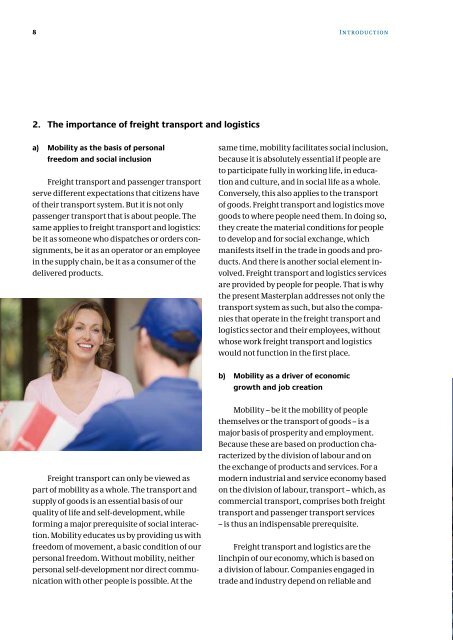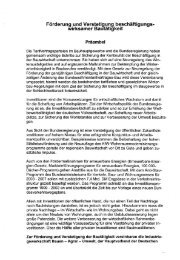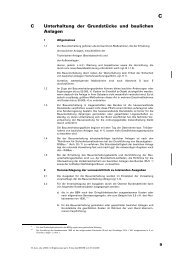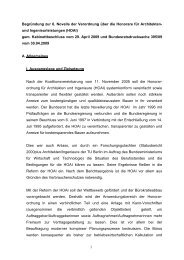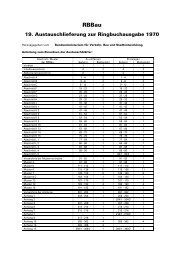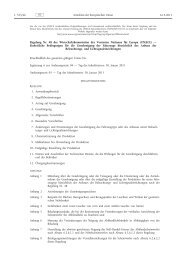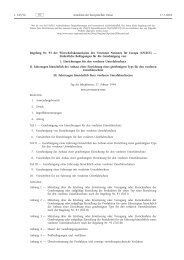Freight Transport and Logistics Masterplan - Bundesministerium für ...
Freight Transport and Logistics Masterplan - Bundesministerium für ...
Freight Transport and Logistics Masterplan - Bundesministerium für ...
Create successful ePaper yourself
Turn your PDF publications into a flip-book with our unique Google optimized e-Paper software.
. The importance of freight transport <strong>and</strong> logistics<br />
a) Mobility as the basis of personal<br />
freedom <strong>and</strong> social inclusion<br />
<strong>Freight</strong> transport <strong>and</strong> passenger transport<br />
serve different expectations that citizens have<br />
of their transport system. But it is not only<br />
passenger transport that is about people. The<br />
same applies to freight transport <strong>and</strong> logistics:<br />
be it as someone who dispatches or orders consignments,<br />
be it as an operator or an employee<br />
in the supply chain, be it as a consumer of the<br />
delivered products.<br />
<strong>Freight</strong> transport can only be viewed as<br />
part of mobility as a whole. The transport <strong>and</strong><br />
supply of goods is an essential basis of our<br />
quality of life <strong>and</strong> self-development, while<br />
forming a major prerequisite of social interaction.<br />
Mobility educates us by providing us with<br />
freedom of movement, a basic condition of our<br />
personal freedom. Without mobility, neither<br />
personal self-development nor direct communication<br />
with other people is possible. At the<br />
same time, mobility facilitates social inclusion,<br />
because it is absolutely essential if people are<br />
to participate fully in working life, in education<br />
<strong>and</strong> culture, <strong>and</strong> in social life as a whole.<br />
Conversely, this also applies to the transport<br />
of goods. <strong>Freight</strong> transport <strong>and</strong> logistics move<br />
goods to where people need them. In doing so,<br />
they create the material conditions for people<br />
to develop <strong>and</strong> for social exchange, which<br />
manifests itself in the trade in goods <strong>and</strong> products.<br />
And there is another social element involved.<br />
<strong>Freight</strong> transport <strong>and</strong> logistics services<br />
are provided by people for people. That is why<br />
the present <strong>Masterplan</strong> addresses not only the<br />
transport system as such, but also the companies<br />
that operate in the freight transport <strong>and</strong><br />
logistics sector <strong>and</strong> their employees, without<br />
whose work freight transport <strong>and</strong> logistics<br />
would not function in the first place.<br />
b) Mobility as a driver of economic<br />
growth <strong>and</strong> job creation<br />
Mobility – be it the mobility of people<br />
themselves or the transport of goods – is a<br />
major basis of prosperity <strong>and</strong> employment.<br />
Because these are based on production characterized<br />
by the division of labour <strong>and</strong> on<br />
the exchange of products <strong>and</strong> services. For a<br />
modern industrial <strong>and</strong> service economy based<br />
on the division of labour, transport – which, as<br />
commercial transport, comprises both freight<br />
transport <strong>and</strong> passenger transport services<br />
– is thus an indispensable prerequisite.<br />
<strong>Freight</strong> transport <strong>and</strong> logistics are the<br />
linchpin of our economy, which is based on<br />
a division of labour. Companies engaged in<br />
trade <strong>and</strong> industry depend on reliable <strong>and</strong><br />
Introduction Introduction<br />
punctual transport operations. This becomes<br />
apparent in particular when the freight transport<br />
<strong>and</strong> supply chain fails to operate smoothly.<br />
The result is not infrequently a loss of<br />
production within a very short period of time,<br />
<strong>and</strong> people become aware of something that<br />
has been largely forgotten, given the fact that<br />
the transport <strong>and</strong> logistics system in Germany<br />
usually operates so well. Namely that almost<br />
every job in trade <strong>and</strong> industry depends directly<br />
or indirectly on a properly functioning<br />
logistics <strong>and</strong> transport system.<br />
One of the main reasons why transport<br />
is of such tremendous importance is that<br />
the German economy is dependent on exports.<br />
The contribution made by exports to<br />
German gross domestic product rose sharply<br />
from 16 % to over 23 % between 1995 <strong>and</strong><br />
2006. This trend will continue in the future,<br />
with a forecast annual growth in exports of<br />
around three percent. Exports are thus the<br />
crucial growth engine of the German economy.<br />
The import of intermediate products<br />
– likewise on the rise – also makes a contribution<br />
to this. Germany is a high-technology<br />
location. As such, it is becoming increasingly<br />
dependent, within the framework of a global<br />
division of labour, on imported inputs,<br />
whose processing <strong>and</strong> final assembly in<br />
Germany creates jobs <strong>and</strong> safeguards the<br />
competitiveness of German companies.<br />
However, this dynamism would not be<br />
possible without a properly functioning<br />
freight transport <strong>and</strong> logistics system. This<br />
transport system represents a significant<br />
locational advantage in global competition.<br />
It makes Germany a more attractive place for<br />
foreign investors <strong>and</strong> helps to create new jobs<br />
in trade <strong>and</strong> industry. This means that freight<br />
transport <strong>and</strong> logistics are a major prerequi


